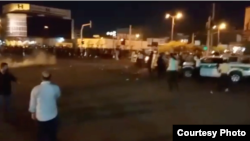Water shortage protests in drought-plagued southwestern Iran appear to have spread to more cities and resulted in what authorities say is a third fatality as the unrest extended into a seventh day.
Videos posted to social media appeared to show street protests on Wednesday in several parts of Khuzestan province, including the cities of Susangerd and Masjed Soleyman. Demonstrators said to be in Masjed Soleyman chanted, “Police, support us,” a reference to local concerns about security forces cracking down harshly on earlier rallies.
Other social media videos appeared to show Iranians in the city of Yazdenshahr, in neighboring Isfahan province, rallying in support of the Khuzestan protesters. The Isfahan rally would be the first such protest in the province since the daily protests began in Khuzestan last Thursday and evolved into the widest and most sustained disturbances Iran has seen in months.
VOA could not independently verify the videos said to be from Khuzestan and Isfahan. Iran has barred VOA from reporting inside the country.
In another development, Iranian state-approved news site ILNA quoted the top official of Izeh city in Khuzestan, Hassan Nabouti, as reporting the death of one person in local protests against water shortages on Tuesday.
Nabouti said the person was wounded in the protests and taken to a hospital by a private car but was pronounced dead. Nabouti said an investigation was under way to identify the attacker and added that 14 security personnel were hurt in the protests.
Iranian state media previously reported the killings of two men by gunfire during demonstrations last Friday.
Social media videos that appeared to be from Tuesday’s protests in Izeh but could not be verified by VOA showed protesters chanting “Death to Khamenei” and “Reza Shah, bless your soul.” Gunshots also were heard in those videos.
“Death to Khamenei” has been a common refrain of Iranian anti-government protesters angered by the authoritarian rule of Supreme Leader Ayatollah Ali Khamenei in recent years.
“Reza Shah, bless your soul” also has been uttered in previous waves of Iranian street protests as a sign of affection toward the founder of the nation’s former monarchy, Reza Shah. Khamenei’s predecessor, Ayatollah Ruhollah Khomeini, ousted Reza Shah’s son from power in Iran’s 1979 Islamic Revolution.
Another series of videos that were sent to VOA Persian and posted on social media appeared to show Monday night protests in several other parts of Khuzestan, including the provincial capital, Ahvaz, and the cities of Andimeshk, Hamidiyeh, Ramhormoz, Shooshtar and Susangerd. Those clips showed protesters chanting slogans denouncing the lack of drinking and agricultural water in the province, with gunfire audible in some places. The images also could not be verified by VOA.
Many of the protesters seen in videos from the first two nights of the protests were chanting slogans in Arabic. Khuzestan is home to a significant ethnic Arab minority that long has complained of discrimination and neglect by the Islamist rulers of Persian-majority Iran.
But Tuesday’s apparent protest in Izeh, a city that is not predominantly Arab, indicated that the anti-government protests sweeping Khuzestan are not driven only by ethnic minority grievances.
Iranian leaders were quoted in state media as saying they had sent delegations to Khuzestan in recent days to examine the water shortages and reports of fatal shootings of protesters.
In a Wednesday press briefing, U.S. State Department spokesperson Ned Price said Washington is closely following the Khuzestan protests “including reports that security forces have fired on protesters.”
“We support the rights of Iranians to peacefully assemble and to express themselves. Iranians, just like any other people, should enjoy those rights without fear of violence, without fear of arbitrary detention by security forces,” Price said.
A group of prominent Iranian rights activists, including Narges Mohammadi, held a rally in front of Iran’s Interior Ministry in Tehran on Tuesday to express solidarity with the Khuzestan protesters.
A video shared on social media showed former political prisoners Mohammadi, Arash Sadeghi, Jafar Azimzadeh and several other activists gathered outside the ministry as Mohammadi spoke in defense of what she called the innocent people of Khuzestan.
Mohammadi’s husband, Taghi Rahmani, who lives in exile in France, tweeted Tuesday that his wife and some of the other activists at the rally were beaten and arrested by security forces. In a second tweet five hours later, Rahmani said they had all been released. There was no mention of the incident in Iranian state media.
Iran’s water shortages partly are the result of weather-related factors, including a sharp drop in rainfall, which has been more than 40% below last year’s levels in recent months, combined with high summer temperatures.
Experts say decades of Iranian government mismanagement also have fueled the drought. They blame authorities’ poorly considered placement and construction of hydroelectric dams and the diversion of water from Khuzestan’s rivers and wetlands to industrial sites in neighboring regions, practices that have dried up sources of drinking and agricultural water for Khuzestan residents.
In a Monday interview with VOA Persian, France-based Iranian sociologist Jalal Idjadi said the water shortages have exacerbated the coronavirus pandemic in Khuzestan. He said provincial news reports suggest the percentage of the population that has received coronavirus vaccines is in the low single digits.
“The water shortage has impacted people’s health and the spread of the coronavirus,” Idjadi said.
This article originated in VOA’s Persian Service. Click here to read the original Persian version of the story.




